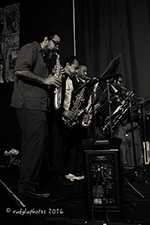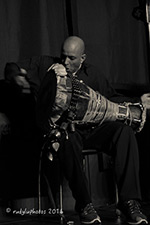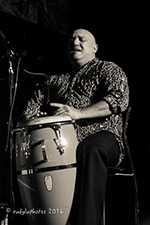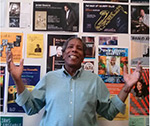 |
|
A brigade of brass and a battalion of batá convened Saturday night to close out the inaugural season of the Madison Jazz Series. As the final installment of a festival curated to exhibit jazz’s global reach, the Afro Cuban Jazz Saxtet deftly traced this strain’s storied trek from Nigeria’s Yoruba country through Cuba, to the greater Caribbean, Latin America, and not incidentally, the United States. Led by Onel Mulet, who’s as skilled an advocate and scholar as he is a saxophonist, even the staging of the concert reflected a traditional mode of call and response. With a bevy of saxes comprised of alto, baritone, tenor and soprano on one side, the horn group was situated ceremonially across from the sacred ground that a thicket of percussionists on batá, conga, trap and gourd, were sanctifying. This arrangement also seemed to make for dramatic fields of interplay that occurred between “the modern” and “the folkloric.” This musical genealogy was not merely historical artifice. The evening’s two sets, taken as a whole, performed a lucidly authentic timeline whose cultural trail markers lead right up to the present. Mulet was adamant about giving early creators such as 19th century violinist composer José White, their rightful due. The Cuban White was the first to write African-based habanera rhythms that would spread vine-like and spawn tango congo; and clave; and the Santeria legacy of which the Saxtet’s Mr. Monteagudo is the living tail end; and New Orleans second line; and Chano Pozo meeting Dizzy Gillespie; and “Manteca” becoming a 52nd Street American jazz staple; and this evening’s band incorporating Freddy Hubbard and Horace Silver tunes. Presto, there you have it; as the world turns. Joining Mulet in the horn squad were Jay Rodriguez, Jason Marshall and Stantawn Kendrick on alto, baritone, on tenor, respectively. The three percussionists all played small, medium and large batá, the double-headed hourglass-shaped drum from Nigeria, and now Cuban Santeria. Mike Ramsey doubled on gourd, Tony Devivo on conga, and Rafael Monteagudo on contemporary drum set. Each faction played with an esprit de corps that enhanced the communal roots of the music. The horns created a village whose multiple voices held a vibrant caucus. Virtuoso soloists expressed all the vicissitudes of life in ballad-style contexts as well as in quickened bonfire pace. And when they spoke in unison they were a sage, ponderous council; or they fanned flames to a higher fury. With all four saxes fully arrayed, the textures were custom loomed like multipurpose fabric. The drum contingent was no less versatile. Their agile, polyrhythmic jockeying portrayed everything from simple single-line musing, to full bore onslaught! More often than not a drum number would begin to swell as yet another drum jumped into the fray. Gradually all the drums might sync up and espouse a dynamic statement. But wait, there’s more. Like a late-stage rocket booster kicking in, a dominant drum, the big batá (iya) or the jazz drum set, might seek primacy and veer away from the pack. There were passages where the Saxtet geared up in the passing lane of a number with all elements under peak power, with old and new traditions in fervent dialogue, the sacred integrated with the profane. Moments like those uniquely positioned this outfit to race headlong into the future, forging ever expanding new diasporas. Hopefully the Madison Series administrators will be bolstered by this season’s ever expanding attendance figures, the keen insight that went into the successful selection process, and the eventual harvest of the perennial jazz seeds they’ve planted. |




